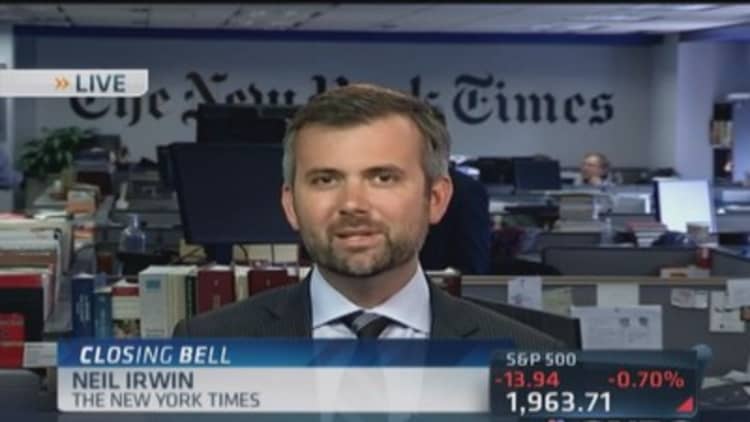
In Spain, where there was a debt crisis just two years ago, investors are so eager to buy the government's bonds that they recently accepted the lowest interest rates since 1789.
In New York, the Art Deco office tower at One Wall Street sold in May for $585 million, only three months after the going wisdom in the real estate industry was that it would sell for more like $466 million, the estimate in one industry tip sheet.
In France, a cable-television company called Numericable was recently able to borrow $11 billion, the largest junk bond deal on record — and despite the risk usually associated with junk bonds, the interest rate was a low 4.875 percent.
Read MoreWhy this bullish pro sees big market drop soon
Welcome to the Everything Boom — and, quite possibly, the Everything Bubble. Around the world, nearly every asset class is expensive by historical standards. Stocks and bonds; emerging markets and advanced economies; urban office towers and Iowa farmland; you name it, and it is trading at prices that are high by historical standards relative to fundamentals. The inverse of that is relatively low returns for investors.
The phenomenon is rooted in two interrelated forces. Worldwide, more money is piling into savings than businesses believe they can use to make productive investments. At the same time, the world's major central banks have been on a six-year campaign of holding down interest rates and creating more money from thin air to try to stimulate stronger growth in the wake of the financial crisis.
Read More
"We're in a world where there are very few unambiguously cheap assets," said Russ Koesterich, chief investment strategist at BlackRock, one of the world's biggest asset managers, who spends his days scouring the earth for potential opportunities for investors to get a better return relative to the risks they are taking on. "If you ask me to give you the one big bargain out there, I'm not sure there is one."
But frustrating as the situation can be for investors hoping for better returns, the bigger question for the global economy is what happens next. How long will this low-return environment last? And what risks are being created that might be realized only if and when the Everything Boom ends?
More from the New York Times:
Israel Calls Up 1,500 Troops as Tensions Mount With Hamas
U.S. Scrutiny for Banks Shifts to Germany
Iraqi Parliament Wobbles Over New Government

Safe assets, like United States Treasury bonds, have been offering investors paltry returns for years, ever since the global financial crisis. What has changed in the last two years is that risky assets, like stocks, junk bonds, real estate and emerging market bonds, have also joined the party.
Want to buy shares of American companies? At the current level of the Standard & Poor's 500 index, every dollar invested in stocks buys you about 5.5 cents of corporate earnings, down from 7.4 cents two years ago — and lower than just before the global financial crisis in 2007-8.
Prefer a more solid asset? The price of office and apartment building has risen similarly; office space in central business districts nationwide costs $300 per square foot on average, up from $147 in early 2010, according to Real Capital Analytics. In Manhattan, an investor in an office building can expect rent payments after expenses to add up to only a 4.4 percent return, known as the capitalization rate, lower than even in 2007, the top of the last boom.
Read MoreNot always a rose: Avoiding thorny asset-liquidation issues indivorce
What about overseas investments? Spain and other Southern European countries that were the nexus of the European debt crisis are not the only places where bond rates have plummeted (even Greece was able to issue bonds at favorable rates earlier this year). Emerging markets, which generally have higher interest rates because of higher inflation and less political stability, are offering record low interest rates as well. Bonds issued by the governments of Brazil and Malaysia, for example, are currently yielding only around 4 percent.
The high valuations now aren't as extreme as those of stocks in 2000 or houses in 2006; rather, what is new is that it applies to such a breadth of assets. In 2000, when the stock market was, with hindsight, a speculative bubble, other assets like bonds, emerging market investments and real estate looked reasonable.

